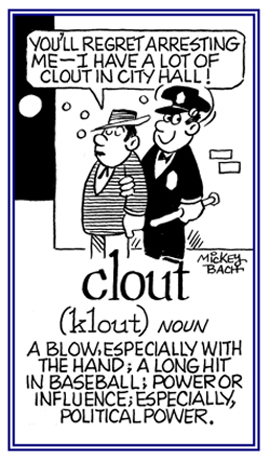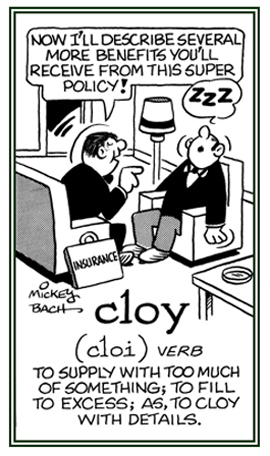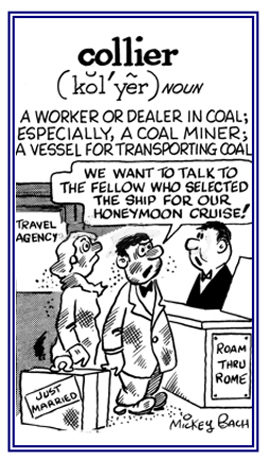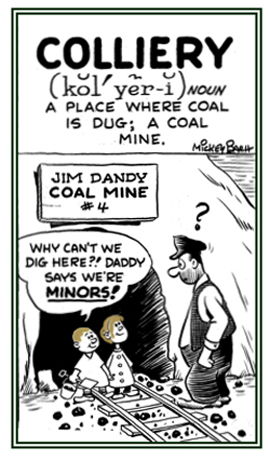English Words in Action, Group C
(a variety of English words which have developed through history and are currently used in our modern age)
Simply click on this banner (or the following link) and you will be on your way to stimulate your brain for greater word comprehension with quizzes based on some of the words in this unit.
clip-on (adjective), more clip-on, most clip-on
That which is attached to something and holds it in place: Boris wore a clip-on necktie and Mildred wore clip-on earrings to the party.
Sam had more clip-on ties than any of his friends.
clipped (adjective), more clipped, most clipped
A reference to speech which is fast and that uses short sounds and very few words; additionally the words are often expressed in an unfriendly or rude way: The mother answered the unruly boy's question in a clipped voice and tone.
1. A tool that is used for cutting something: Sam used the hedge clipper to trim the bushes.
3. A tall masted ship designed for speed; common in the 19th century: In the local shipyards, the shipwrights built a replica of a famous racing clipper.
The manicurist used fingernail clippers to trim her customer's finger and toenails.
The barber cut the man's hair with electric clippers.
2. The removal of something by using scissors or a sharp razor-type tool: Monroe was a daily coupon clipper.3. A tall masted ship designed for speed; common in the 19th century: In the local shipyards, the shipwrights built a replica of a famous racing clipper.
1. An article or a picture that has been separated from a newspaper or magazine: Bernard had a large collection of magazine clippings about his profession as a computer programmer.
2. A small piece of something which has been cut off: Shelly swept up the fingernail clippings before the next customer came in.
2. A small piece of something which has been cut off: Shelly swept up the fingernail clippings before the next customer came in.
Bert put the flower clipping in the lapel or the front edge of his jacket.
1. A strong political or business influence, power, or force that controls certain situations: Mable used her clout as a mayor to have another school built in a neighborhood that has a lot of new residents.
2. A hard hit with the hand: When Jimmy saw a mosquito, or other insect on his arm, he would try to get rid of it with a clout.

© ALL rights are reserved.
Go to this Word A Day Revisited Index
2. A hard hit with the hand: When Jimmy saw a mosquito, or other insect on his arm, he would try to get rid of it with a clout.

Go to this Word A Day Revisited Index
so you can see more of Mickey Bach's cartoons.
cloy (verb), cloys; cloyed; cloying
1. To become sick with an excessive amount of food that is too sweet or too rich: Jerry never realized how upsetting his stomach would be until after he cloyed 14 chocolate donuts and three root beers.
2. To make or to develop a tiredness, or weariness, even when one has too large a quantity of anything pleasant: When Karen was applying for a scholarship to a university, she had an appointment with an administrator who was verbally reading the list of excellent grades she had in high school and it cloyed Karen to the point of almost putting her to sleep.

© ALL rights are reserved.
Go to this Word A Day Revisited Index
2. To make or to develop a tiredness, or weariness, even when one has too large a quantity of anything pleasant: When Karen was applying for a scholarship to a university, she had an appointment with an administrator who was verbally reading the list of excellent grades she had in high school and it cloyed Karen to the point of almost putting her to sleep.

Go to this Word A Day Revisited Index
so you can see more of Mickey Bach's cartoons.
A coal miner or a ship carrying coal: The original sense of collier was a maker of charcoal, who usually brought it to market; therefore, a person selling charcoal and then later someone who was selling coal.

© ALL rights are reserved.
Go to this Word A Day Revisited Index

Go to this Word A Day Revisited Index
so you can see more of Mickey Bach's cartoons.
A workplace consisting of a coal mine plus all the buildings and equipment connected with it: Some men who spend their lives in collieries have been severely injured or killed when the tunnels have collapsed on them.

© ALL rights are reserved.
Go to this Word A Day Revisited Index

Go to this Word A Day Revisited Index
so you can see more of Mickey Bach's cartoons.
1. A long thick post made of steel, stone, etc., which is used as a support of a roof or for decorating the outer parts of a building: The building has a facade with beautiful marble columns.
2. A group of printed or written items; including, numbers or words that are shown under each other down a page: Cleo was told to add the first column of numbers.
3. Any of one or two (or more) sections of print which appear next to each other on a page and that are separated by a blank space or a line: The article consists of three columns, but the error is at the bottom of the first column.
4. An article in a newspaper or magazine which appears regularly and that is written by a particular writer or which deals with a particular subject or topic: Manfred writes a weekly column for the local newspaper.
5. That which is tall and thin in form or shape: The worried residents could see the columns of smoke rising up from the brush fire.
6. A long row of people or things: There was a column of cars going up the highway in the thunder storm.
7. Etymology: from the mid 15th century, "vertical division of a page"; also, "a pillar, a post", from Old French colombe, Modern French colonne, "column, pillar", from Latin columna, "pillar" and from a form of columen, "top, summit".
2. A group of printed or written items; including, numbers or words that are shown under each other down a page: Cleo was told to add the first column of numbers.
3. Any of one or two (or more) sections of print which appear next to each other on a page and that are separated by a blank space or a line: The article consists of three columns, but the error is at the bottom of the first column.
4. An article in a newspaper or magazine which appears regularly and that is written by a particular writer or which deals with a particular subject or topic: Manfred writes a weekly column for the local newspaper.
5. That which is tall and thin in form or shape: The worried residents could see the columns of smoke rising up from the brush fire.
6. A long row of people or things: There was a column of cars going up the highway in the thunder storm.
7. Etymology: from the mid 15th century, "vertical division of a page"; also, "a pillar, a post", from Old French colombe, Modern French colonne, "column, pillar", from Latin columna, "pillar" and from a form of columen, "top, summit".
In computer programming, a method of defining a matrix by naming the elements one column at a time, as opposed to row order: The computer technician installed a new column order to facilitate the creation of textual content.
A "matrix" in this context is an array of symbols arranged in rows and columns.
columnar (kuh LUM nuhr) (adjective), more columnar, most columnar
1. Designed to include a vertical architectural support: The architect included a columnar design in her drawings for the new city hall.
2. Presented with long vertical listings of information or data: The budgetary data from city hall was presented in a columnar format.
2. Presented with long vertical listings of information or data: The budgetary data from city hall was presented in a columnar format.
columned (KAHL uhmd) (adjective), more columned, most columned
1. Having posts or standards that are slender and upright: The columned facade was attractive and pleasing for the public to see in the new courthouse.
2. Formed into a vertical display or presentation of information: She quickly added the columned numbers on the finance sheet that was on the desk.
2. Formed into a vertical display or presentation of information: She quickly added the columned numbers on the finance sheet that was on the desk.
columniferous (adjective), more columniferous, most columniferous
A reference to that which is formed into pillars, or tall cylindrical and vertical upright structures: The columniferous coniferous forest was awesome with the tall trees reaching towards the sky.
A writer of feature articles, that appear regularly in a publication; such as, a newspaper or a magazine: Henry is a sports columnist for the local newspaper.
concede (kuhn SEED) (verb), concedes; conceded; conceding
1. To acknowledge that something is true, justified, or proper; even though it is often done reluctantly: Bill had to concede defeat after the other runner passed him just before the finish line.
"Bill, your plan might work," Mary conceded, "but I am still convinced that mine is better."
2. Etymology: from Latin concedere, "to yield, to give way, to go away, to depart"; figuratively "to agree, to consent"; from com-, "with, together" + cedere, "to go, to grant, to give way".Links to all of the groups of English words in action, Groups A to Z.
You may see the bibliographic list of sources of information for these words in action.


